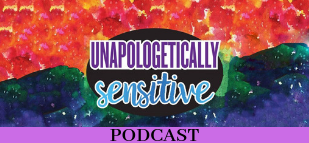How do you get back in a groove after you’ve gotten out of it? We often assume we can jump back in, but sometimes it’s harder than that. I also talk about getting consent in relationships before giving feedback and advice. Attuning to the other person is the best gift you can give someone. This means dropping your agenda. I also talk about how to communicate your sensory needs when others are unaware. It can be exhausting it can be for us when we have to compensate and when we are overstimulated.
HIGHLIGHTS
20 takeaways from this episode:
- Strategies for managing the transition from the holiday season to regular routines.
- Tips for handling difficult conversations with loved ones.
- The importance of active listening in communication.
- How to show empathy and validate others’ feelings.
- The benefits of setting clear boundaries in conversations.
- The use of “I” statements to express thoughts and feelings.
- The importance of seeking compromise in challenging discussions.
- The value of taking breaks during emotionally charged conversations.
- The benefits of seeking professional help from a therapist or coach.
- Understanding attachment wounds and their impact on relationships.
- The concept of PDA (pathological demand avoidance or Pervasive/Persistent Drive for Autonomy) and its effects on communication.
- The importance of attunement in relationships.
- The role of consent in sharing with someone who is struggling.
- The value of self-compassion and acceptance of all emotions.
- Strategies for managing sensitivity and emotional reactions.
- The benefits of eliminating inflammatory foods from one’s diet.
- The challenges of navigating family dynamics during the holiday season.
- The importance of managing expectations in relationships.
- The value of self-reflection and self-awareness in communication.
- The benefits of practicing mindfulness and self-care in daily life.
Additional Takeaways
- Seek consent and ask for permission before sharing personal reactions or opinions in conversations.
- Be authentic and true to yourself in personal relationships, while also considering the needs and perspectives of others.
- Strive for a balance between routine and self-care, and be patient with yourself when facing setbacks.
- Set realistic expectations and practice self-compassion when working towards personal goals.
- Create an affirming household that acknowledges and accommodates the different needs of family members.
- Recognize and respect personal endurance and self-regulation in social situations.
- Embrace self-expression and navigate social interactions in a way that aligns with your neurodivergent traits.
- Take ownership of your own fulfillment and celebrate holidays in a way that aligns with your desires and needs.
- Seek support and embrace your sensitivity as a valuable aspect of your identity.
Chapters (please adjust for the addition of the introdruction:
- 00:00 Introduction and Setting the Stage
- 01:28 Giving Consent in Relationships
- 04:44 Being Authentic and Reacting in Personal Relationships
- 07:27 Struggling with Routine and Self-Care
- 10:05 Setting Expectations and Practicing Self-Compassion
- 11:32 Navigating Family Dynamics and Accommodating Needs
- 16:31 Managing Personal Endurance and Self-Regulation
- 20:53 Navigating Social Situations and Self-Expression
- 22:17 Celebrating Holidays and Self-Fulfillment
- 25:36 Seeking Support and Embracing Sensitivity
PODCAST HOST
Patricia was a Licensed Clinical Social Worker for over 17 years, but she is now exclusively providing coaching. She knows what it’s like to feel like an outcast, misfit, and truthteller. Learning about the trait of being a Highly Sensitive Person (HSP), then learning she is AuDHD with a PDA profile and RSD, helped Patricia rewrite her history with a deeper understanding, appreciation, and a sense of self-compassion. She created the podcast Unapologetically Sensitive to help other neurodivergent folks know that they aren’t alone, and that having a brain that is wired differently comes with amazing gifts, and some challenges. Patricia works online globally working individually with people, and she teaches Online Courses for neurodivergent folks that focus on understanding what it means to be a sensitive neurodivergent. Topics covered include: self-care, self-compassion, boundaries, perfectionism, mindfulness, communication, and creating a lifestyle that honors you
LINKS
HSP Online Course–https://unapologeticallysensitive.com/hsp-online-groups/
Online HSP Course Materials (no group included) https://patriciayounglcsw.com/product-category/hsp-classes/
Receive the top 10 most downloaded episodes of the podcast– https://www.subscribepage.com/e6z6e6
Sign up for the Newsletter– https://www.subscribepage.com/y0l7d4
To write a review in itunes:
- click on this link https://itunes.apple.com/us/podcast/unapologetically-sensitive/id1440433481?mt=2
- select “listen on Apple Podcasts”
- chose “open in itunes”
- choose “ratings and reviews”
- click to rate the number of starts
- click “write a review”
Website–www.unapologeticallysensitive.com
Facebook– https://www.facebook.com/Unapologetically-Sensitive-2296688923985657/
Closed/Private Facebook group Unapologetically Sensitive– https://www.facebook.com/groups/2099705880047619/
Instagram– https://www.instagram.com/unapologeticallysensitive/
Youtube– https://www.youtube.com/channel/UCOE6fodj7RBdO3Iw0NrAllg/videos?view_as=subscriber
Tik Tok–https://www.tiktok.com/@unapologeticallysensitiv
e-mail– unapologeticallysensitive@gmail.com
Show hashtag–#unapologeticallysensitive
Music– Gravel Dance by Andy Robinson www.andyrobinson.com

